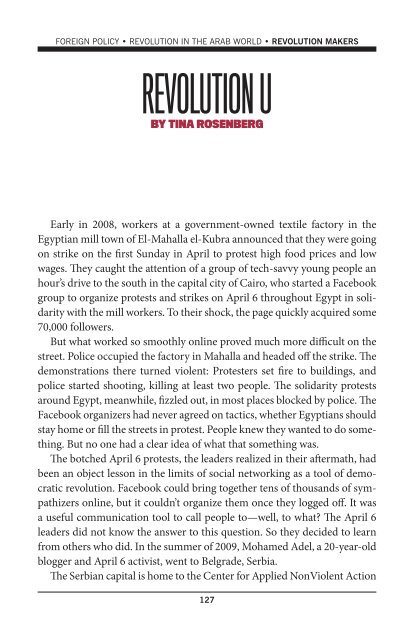Revolution in the Arab World - Observation of a lost soul Blog
Revolution in the Arab World - Observation of a lost soul Blog
Revolution in the Arab World - Observation of a lost soul Blog
You also want an ePaper? Increase the reach of your titles
YUMPU automatically turns print PDFs into web optimized ePapers that Google loves.
foreign policy • revolution <strong>in</strong> <strong>the</strong> arab world • revolution makers<br />
<strong>Revolution</strong> U<br />
by T<strong>in</strong>a Rosenberg<br />
Early <strong>in</strong> 2008, workers at a government-owned textile factory <strong>in</strong> <strong>the</strong><br />
Egyptian mill town <strong>of</strong> El-Mahalla el-Kubra announced that <strong>the</strong>y were go<strong>in</strong>g<br />
on strike on <strong>the</strong> first Sunday <strong>in</strong> April to protest high food prices and low<br />
wages. They caught <strong>the</strong> attention <strong>of</strong> a group <strong>of</strong> tech-savvy young people an<br />
hour’s drive to <strong>the</strong> south <strong>in</strong> <strong>the</strong> capital city <strong>of</strong> Cairo, who started a Facebook<br />
group to organize protests and strikes on April 6 throughout Egypt <strong>in</strong> solidarity<br />
with <strong>the</strong> mill workers. To <strong>the</strong>ir shock, <strong>the</strong> page quickly acquired some<br />
70,000 followers.<br />
But what worked so smoothly onl<strong>in</strong>e proved much more difficult on <strong>the</strong><br />
street. Police occupied <strong>the</strong> factory <strong>in</strong> Mahalla and headed <strong>of</strong>f <strong>the</strong> strike. The<br />
demonstrations <strong>the</strong>re turned violent: Protesters set fire to build<strong>in</strong>gs, and<br />
police started shoot<strong>in</strong>g, kill<strong>in</strong>g at least two people. The solidarity protests<br />
around Egypt, meanwhile, fizzled out, <strong>in</strong> most places blocked by police. The<br />
Facebook organizers had never agreed on tactics, whe<strong>the</strong>r Egyptians should<br />
stay home or fill <strong>the</strong> streets <strong>in</strong> protest. People knew <strong>the</strong>y wanted to do someth<strong>in</strong>g.<br />
But no one had a clear idea <strong>of</strong> what that someth<strong>in</strong>g was.<br />
The botched April 6 protests, <strong>the</strong> leaders realized <strong>in</strong> <strong>the</strong>ir aftermath, had<br />
been an object lesson <strong>in</strong> <strong>the</strong> limits <strong>of</strong> social network<strong>in</strong>g as a tool <strong>of</strong> democratic<br />
revolution. Facebook could br<strong>in</strong>g toge<strong>the</strong>r tens <strong>of</strong> thousands <strong>of</strong> sympathizers<br />
onl<strong>in</strong>e, but it couldn’t organize <strong>the</strong>m once <strong>the</strong>y logged <strong>of</strong>f. It was<br />
a useful communication tool to call people to—well, to what The April 6<br />
leaders did not know <strong>the</strong> answer to this question. So <strong>the</strong>y decided to learn<br />
from o<strong>the</strong>rs who did. In <strong>the</strong> summer <strong>of</strong> 2009, Mohamed Adel, a 20-year-old<br />
blogger and April 6 activist, went to Belgrade, Serbia.<br />
The Serbian capital is home to <strong>the</strong> Center for Applied NonViolent Action<br />
127




